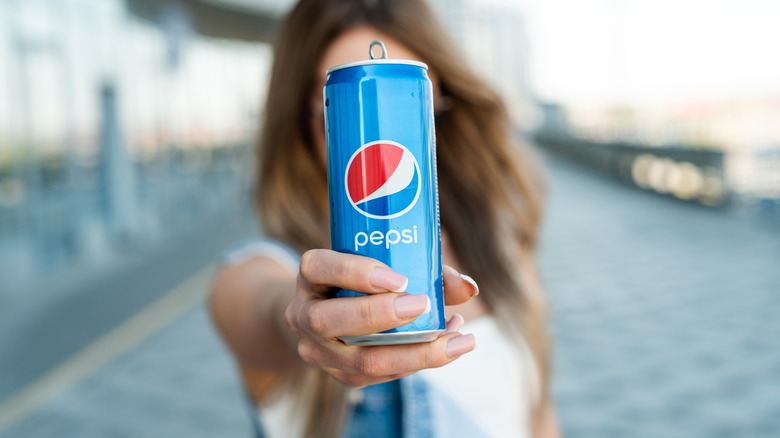The Ingredients You Don't Want To See In The Soda You're Drinking
Most people know that soda is not good for them. However, the addictive nature of the sweet and sugary drinks can be hard to avoid. When you drink a soda, the sugar within causes dopamine to be released, flooding the pleasure centers of your brain, according to the Ohio State University Wexner Medical Center. For many, the habit of drinking soda can become deeply ingrained, making it harder to stop.
However, what was once a hugely popular drink category between the 1960s and 1990s has been declining over recent years (per the New York Times). Despite the average American still drinking almost 39 gallons of soda in 2018, the overall consumption of the beverage has declined for 13 straight years (via Statista). Most of us know about the excessive amount of sugar in soda — 39 grams in a standard 12-ounce can of Coca-Cola, for example. But there are other potentially harmful ingredients to consider as well.
Phosphoric acid
Phosphoric acid is added to many soft drinks to prevent bacterial growth and give it a unique flavor, according to Healthline. The acid is primarily found in dark-colored sodas, such as Coke, Pepsi, and root beer, instead of clear sodas, such as Sprite (per Livestrong).
The acid is made from phosphorus, a mineral naturally found in the body which interacts with calcium to keep bones and teeth strong. However, ingesting too much phosphorus can lead to a decrease in calcium (via Healthline). Additionally, there seems to be a link between the phosphorus in soda and osteoporosis, a disease that's associated with lower bone density, according to WebMD.
But that's not all. Because of the phosphoric acid content, drinking soda can even affect your teeth, regardless of the presence of sugar. The Mississippi State Department of Health states that your teeth can undergo an "acid attack" of up to 20 minutes with each sip, which can weaken enamel and cause cavities.
Aspartame
Despite soft drink companies offering diet alternatives to our favorite brands, diet soda may not be better for you than regular soda, thanks to the ingredient aspartame. Aspartame is an artificial sweetener used to add flavor to diet soft drinks that have less or no sugar compared to the regular versions, according to the American Cancer Society.
However, the ingredient may be linked to numerous health risks. A 2017 review in the Canadian Medical Association Journal suggests that aspartame was associated with increased weight and a higher risk of heart disease, hypertension, and stroke. Aspartame may even affect the central nervous system. A 2016 study published in the Journal of Microscopy & Ultrastructure found that when rats were administered aspartame every day for three months, it caused harm to the sciatic nerve structure and had degenerative impacts to the myelin sheath. But researchers of the study suggest the data is limited and the effects aren't well-understood.
Sodium benzoate
Sodium benzoate is another ingredient that may appear on your soda label. It has many uses and is commonly found in processed foods and drinks in order to prevent spoilage. In fact, it can ensure foods stay shelf-stable for up to two years, according to WebMD. While scientists have generally considered this ingredient safe, there may be potential health risks, particularly when it's mixed with ascorbic acid (vitamin C). Once these elements are combined, they convert into benzene, a known carcinogen that can increase one's risk of cancer.
While this sounds like an undesirable ingredient to have in our food, you're unlikely to consume enough to harm your health. The U.S. Food & Drug Administration has determined that the allowable level of sodium benzoate in drinking water is five parts per billion. WebMD suggests almost all packaged drinks are well under this threshold and thus do not pose a substantial risk to our health.




